AI is no longer a future concept in the world of hospitality, where every guest wants a personal touch and impeccable service; it is transforming hotel operations today.
To provide smooth, personalized experiences that impress guests and increase efficiency, hotels are utilizing AI-driven hospitality solutions.
Connie, an AI-powered concierge at Hilton, is revolutionizing the guest experience.
Connie makes the hotel AI booking system and check-in process easy by assisting guests with everything from hotel amenities to local recommendations.
This change in hospitality technology enables hotels to predict guest preferences, optimize communications, and integrate AI into hotel operations in the background.
Happier guests, easier processes, and more knowledgeable management were the results.
This blog is your best resource for learning about real-world hotel AI booking system case studies and exploring top AI use cases in hospitality.
Find out how AI tools and automation are transforming the hospitality industry.
Why Does AI Matters in the Hospitality Industry?
Let's be honest; when was the last time you waited patiently for room service or stood in line to check in without secretly hoping for a better way?
Yeah, exactly.
Today's guests want everything: speed, uniqueness, and ease. And guess what? AI in hospitality is providing all that and more.
It's not just some cool tech buzzword anymore. It's the real deal, changing how hotels work and how guests feel.
Imagine this: You walk into a hotel, and the front desk already knows your room choice, favorite snack, and even the kind of pillow you like.
Sounds dreamy, right? That's AI for guest experience at work.
From AI-powered concierges like Hilton's Connie to smart hotel booking systems that remember your past stays, AI is turning hotels into intelligent, guest-first experiences.
But it's not just about the guests. Behind the scenes, AI in hotel operations is managing housekeeping, reducing energy use, and predicting demand like a pro.
That means smaller staff loads, better service, and happy guests.
So, why does AI matter in hospitality? Because it makes everything faster, smarter, and more personal.
And in an industry built on comfort and experience, that's not just a win; it's the future. This is why businesses are looking to hire dedicated developers to take steps ahead with AI.
How AI Is Transforming the Hospitality Industry?
Artificial Intelligence in hospitality is no longer a future trend; it's a present requirement.
Leveraging machine learning, data analytics, and AI-driven hospitality solutions, hotels are now rethinking both guest experiences and back-end efficiency.
With tools like AI-powered concierges, robots, and smart hotel technology, the industry is seeing a huge shift.
From 24/7 guest support to personalized service recommendations, AI helps hotels go beyond standards.
By studying guest behavior and hotel booking system data, AI creates truly tailored stays, improves check-ins, and boosts engagement.
Stats don't lie. Over 70% of hotel leaders, according to PwC, are looking to improve output through hospitality automation.
One big brand cut billing cycle time by 85% and halved missed-stay mistakes; all thanks to AI in hotel operations.
Deloitte says that 52% of customers expect AI in guest interaction, and a 2023 global poll ranks AI in hospitality as the top innovation driver for the next two years.
And the real proof?
Just look at the rising number of hotel AI booking system case studies, which show real success stories showing how AI is transforming hotel performance and guest happiness.
So if you're still on the fence about AI, this is your sign. Embracing this tech now means keeping ahead in guest happiness, cost-efficiency, and competitive edge.
Up next? We'll look into the Top Use Cases of AI in Hospitality; real examples of how AI is changing the industry, one smart answer at a time.
Top Use Cases of AI in Hospitality
Ever wonder how your hotel room knows exactly when you want the curtains drawn or how the front desk already has your preferences ready?
That's not magic; it's AI in hospitality working behind the scenes.
From personalized guest services to easy bookings, AI-driven hospitality solutions are transforming how hotels run and how guests experience their stay.
Let's explore some of the most exciting, real-world AI use cases in hospitality, with some jaw-dropping results straight from hotel AI booking system case studies.
1. AI-Powered Chatbots for Customer Service
AI-powered chatbots in hospitality are way more than simple FAQ bots.
They're international, available 24/7, and use advanced NLP to handle complicated guest requests easily.
Whether guests want to book spa sessions, ask about amenities, or get dining recommendations, these chatbots handle it all quickly.
By providing fast, personalized service around the clock, they greatly improve AI for guest experience, freeing up staff to focus on high-touch interactions that truly impress.
Looking to deploy your own smart assistant? Consider investing in a top-tier AI chatbot development service to make guest interactions smoother, smarter, and more satisfying.
2. Smart Room Personalization with IoT & AI
Imagine walking into a room where lights change to your mood, the temperature feels just right, and your favorite music starts playing automatically.
That's the magic of AI hotel personalization.
By analyzing guest data like preferences, past stays, and even time of day, AI creates ultra-personalized experiences that surprise and please at every touchpoint.
This smart tech turns ordinary hotel rooms into unique havens, making each stay special and truly tailored to you.
3. Virtual Concierges for Guest Assistance
Say hello to your digital helper; AI-powered concierges that make every guest feel VIP.
Whether you're craving local restaurant tips, want to book last-minute event tickets, or need quick info on hotel amenities, these smart helpers have you covered quickly and intelligently.
They work around the clock, providing personalized recommendations and smooth support, taking AI for guest experience to the next level and leaving human staff to focus on the moments that really count.
4. Predictive Analytics for Demand Forecasting
Why guess when you can predict? That's the power of AI in hotel management.
By analyzing past data and real-time trends, AI helps hotels predict demand with incredible accuracy.
This means better choices on occupancy, hiring, and resource sharing; no more overbooking or short jobs.
With AI-driven predictive analytics, hotels can optimize operations, reduce costs, and boost guest happiness by ensuring everything goes like clockwork.
It's the ultimate game-changer for speed and revenue in the hospitality industry.
5. Automated Check-in and Check-out Systems
Say goodbye to front desk lines!
Thanks to hospitality automation, guests now enjoy fast check-ins and check-outs through apps, self-service machines, or even face recognition technology.
This smooth process saves time and trouble, letting guests dive straight into relaxing or work without waiting.
By easing landings and exits, AI improves ease, boosts guest happiness, and frees staff to focus on creating unique experiences throughout the stay.
6. AI for Revenue and Pricing Management
Dynamic pricing isn't new; but AI takes it to the next level.
Hotels use AI to dive deep into booking trends, market demand, and competitor rates, crunching the numbers to optimize pricing strategies in real time.
This smart method ensures rooms are priced just right; boosting income while keeping guests happy.
It's AI for hotel management working its magic, making pricing better, faster, and way more effective.
7. Facial Recognition for Seamless Security
For faster access and improved safety, AI in hotel operations now includes biometric solutions such as face recognition.
This cutting-edge technology speeds up ID verification, allowing guests to breeze through security checkpoints without the trouble of human checks.
Beyond ease, it improves security protocols by correctly identifying people and stopping unauthorized access.
By mixing speed with top-notch safety, face recognition is changing the guest experience and setting new standards for smart, secure hospitality.
8. Voice Assistants for In-Room Control
"Turn off the lights" or "Order room service"; guests can now do it all hands-free, thanks to voice assistants transforming hospitality.
Voice-activated rooms feel like giving your space a brain of its own, making every interaction effortless and natural.
This AI-driven hospitality solution improves personalized guest services with AI, letting guests manage lights, temperature, entertainment, and more through simple voice requests.
Beyond ease, it improves the entire guest experience, making smart hotel environments that are both modern and amazingly comfortable.
Welcome to the future of hospitality automation and creativity!
9. AI for Housekeeping and Maintenance Scheduling
Need a towel change or AC repair?
With AI, smart systems watch real-time data to schedule and dispatch housekeeping and repair staff exactly when and where they’re needed.
This boosts organizational productivity by cutting reaction times and avoiding service delays.
Guests enjoy a smooth stay with quick attention to their needs, while hotels optimize resources and staff efficiency.
It’s a great example of how hospitality automation driven by AI is raising the bar for guest happiness and smooth operations.
10. AI-Driven Sentiment Analysis for Guest Feedback
Manually reading guest reviews?
That’s so last decade. Thanks to AI-driven hospitality solutions, hotels now use smart AI tools to scan feedback across multiple platforms quickly.
These tools assess trends, sense guest mood, and find areas for change with incredible accuracy.
This real-time information helps hotels fine-tune their services, solve problems faster, and offer exactly what guests want.
By deploying AI for guest experience and hospitality automation, hotels can improve happiness, build trust, and stay ahead in the competitive hospitality industry.
From front-desk automation to smart room tech, these AI apps in hospitality management are not just cool, they’re business boosts.
And with proven results from countless hotel AI booking system case studies, it's clear that AI in hospitality is here to improve every touchpoint.
Looking to make your mark? Teaming up with the best mobile app development company can turn your hospitality vision into reality.
Wanna see how real hotels are slaying the game with this tech? Let’s move on to the best examples from across the industry.
Benefits of Using AI in Hospitality
AI in hospitality is no longer just a buzzword; it's a game-changer that's transforming how hotels run and how guests experience their stay.
The benefits of using AI are undeniable, offering better, faster, and more personalized services that today's travelers crave.
From hotel AI booking system case studies to real-world implementations, AI-driven hospitality solutions boost operational efficiency by handling everyday tasks like check-ins, housekeeping schedules, and even pricing strategies.
This means fewer mistakes, reduced costs, and better day-to-day management.
Plus, AI improves personalized guest services with AI by analyzing guest likes and behavior, allowing hotels to change everything from room settings to activity recommendations.
Guest engagement skyrockets when AI-powered chatbots and virtual concierges provide fast, round-the-clock help, improving the overall AI for guest experience.
Meanwhile, predictive analytics optimize revenue and occupancy, ensuring hotels stay competitive and profitable.
Simply put, the benefits of AI in hospitality include better efficiency, heightened personalization, cost savings, and a stronger link with guests.
For any hospitality business serious about scaling, evolving, and delighting travelers; develop a travel app infused with AI. Because in this game, AI isn't optional. It's essential.
Ready to lead the change?
Let’s dive into the top AI use cases in hospitality next.
How Top Brands Use AI in Hospitality?
Artificial Intelligence is changing up the hospitality industry, providing better, faster, and deeply personalized guest experiences.
Top hotel brands are pioneering the use of AI-driven hospitality solutions and hotel AI booking system case studies that set the bar for innovation and efficiency.
Let’s take a look at some of the leading names transforming hospitality with AI:
1] Hilton
Hilton’s Connie is a great example of AI-powered hospitality innovation.
This smart AI concierge helps guests easily by answering questions about hotel amenities, nearby dining, and local sites.
Using advanced natural language processing and machine learning, Connie personalizes every interaction, making guests feel truly understood and cared for.
By improving personalized guest services with AI, Hilton not only boosts convenience but also improves the overall guest experience, setting a high bar for AI-driven hospitality solutions in the industry.
2] Marriott International
Marriott International is at the forefront of using AI in hospitality to enhance guest relations and optimize operations.
The brand employs AI-powered chatbots that provide 24/7 customer support, quickly answering inquiries and booking requests, which improves response and guest satisfaction.
Additionally, Marriott uses predictive analytics to estimate demand correctly, allowing better hiring and inventory management.
These insights also fuel dynamic pricing strategies, allowing the hotel to adjust rates in real-time based on market trends, increasing revenue while offering competitive pricing for guests.
3] Hyatt
Hyatt is tapping into AI-powered hospitality solutions to change both marketing and revenue management.
By analyzing guest data and behavior, Hyatt tailors marketing efforts that speak directly to individual preferences, boosting engagement and brand loyalty.
At the same time, AI helps optimize room rates by measuring market demand, rival pricing, and booking trends.
This smart hotel technology ensures Hyatt maximizes revenue while giving competitive prices, creating a win-win for both the business and its guests.
It’s AI working smart behind the scenes for amazing stays.
4] Accor Hotels
Accor Hotels is accepting AI-driven hospitality solutions by adding face recognition technology to change the guest check-in experience.
This cutting-edge system speeds up check-ins by quickly checking guest names, removing long waits at the front desk.
Beyond convenience, it greatly improves security protocols, ensuring better stays.
Additionally, this AI-powered approach boosts operational productivity by automating manual tasks and reducing mistakes.
With AI at its core, Accor is setting new standards in smart hotel technology, mixing safety, speed, and smooth service for guests.
5] InterContinental Hotels Group (IHG)
InterContinental Hotels Group (IHG) uses AI to change housekeeping and hotel operations.
By analyzing real-time data and guest patterns, AI improves housekeeping schedules, ensuring rooms are cleaned quickly and on time.
This smart approach boosts staff productivity and reduces wait times for guests, leading to a faster, more satisfying stay.
IHG’s adoption of AI-driven hospitality solutions shows how technology can enhance both operational efficiency and the overall guest experience.
6] The Ritz-Carlton Yacht Collection
The luxury brand expertly uses AI-driven hospitality solutions to adjust every part of the guest trip, ensuring a memorable experience.
From knowing dining preferences to offering personalized aboard activities, AI studies guest data to anticipate needs and deliver tailored services.
This smooth personalization not only enhances guest satisfaction but also improves the sense of luxury and comfort.
By integrating smart technology throughout the stay, the brand redefines luxury hospitality, creating a smooth, intuitive, and deeply engaged experience that keeps guests coming back for more.
7] Kempinski Hotels
Kempinski uses advanced AI tools to study guest feedback across multiple platforms, finding mood trends that show what guests love and where improvements are needed.
By constantly watching and analyzing this data, the hotel can improve its service quality in real-time, ensuring every stay beats expectations.
This AI-driven approach helps Kempinski stay ahead in the hospitality industry by providing consistently excellent, personalized experiences that keep guests coming back.
Inspired by how top brands harness AI to enhance operations and increase revenue? While AI transforms hospitality, it also offers unique challenges- especially when balancing innovation with practicality.
Understanding these hurdles is just as important as recognizing the benefits. From implementation costs to maintaining the human touch, businesses must navigate carefully.
As you explore AI integration, don’t forget the key features in travel app that make these innovations truly effective.
Let’s dive into these challenges and discover what it really takes to successfully implement AI in hospitality strategies.
Challenges & Considerations for AI Adoption
While the benefits of AI in hospitality are game-changing, adopting this smart tech isn’t all smooth sailing.
Integrating artificial intelligence in the hospitality industry offers several challenges that hotels must handle strategically to unlock its full potential.
A] High Costs of Implementation
Let’s face it, setting up AI-powered hospitality solutions isn’t cheap.
From investing in AI hotel personalization tools to training staff on new systems, the starting cost can be frightening.
But here’s the good news: many hotels are now moving to AI as a Service (AIaaS).
This model allows businesses to access scalable AI tools for hospitality without burning a hole in their budgets, paying only for what they need.
When considering the cost to develop a travel app, choosing AIaaS can greatly reduce expenses while still providing powerful AI-driven features.
B] Balancing Automation with a Personal Touch
Sure, hospitality automation boosts speed, but guests still crave the human touch. Over-automating can feel cold.
A smart approach? Use AI-powered chatbots and virtual concierges for regular tasks, and free up staff to focus on high-touch, personalized guest services.
C] Data Privacy and Security
With AI in hotel operations collecting and analyzing private guest data, security becomes non-negotiable.
Hotels must ensure strong hacking systems, frequent checks, and compliance with global data protection laws.
D] Integration with Existing Systems
New tech meets old tech; start the action. Many AI-driven hospitality solutions struggle to sync with old hotel systems.
The fix? Choose AI tools built for smooth merging or install software to bridge the gap.
E] Ethical Considerations
From skewed algorithms to confusing decision-making, ethics challenges are real.
Regularly reviewing AI models and using various datasets help ensure fairness, openness, and a better AI guest experience.
Overcoming these hurdles is important for long-term success. Once understood, AI becomes not just a tech update; but a real game-changer.
Future Trends: What’s Next for AI in Hospitality?
AI in hospitality isn’t just changing; it’s accelerating.
As we move ahead, expect artificial intelligence in the hospitality industry to take on a more transformative role, driven by next-gen technologies and better, more natural guest experiences.
Let’s break down where things are headed:
► Generative AI Integration
Generative AI in hospitality is set to change how hotels offer personalization.
Think room setting, entertainment options, or dining tips; all personalized in real-time, changing to guest preferences and external factors like weather or time of day.
Beyond customization, advanced language models will ease multilingual communication, breaking obstacles and improving service for international guests.
Plus, with AI app development services, hotels can make hyper-personalized travel guides, smart itineraries, and dynamic in-app experiences; elevating the guest journey from ordinary to unforgettable.
► IoT for Smart Hotel Rooms
With AI and IoT working together, smart hotel rooms are becoming the new standard. Lights, temperature, and curtains change instantly based on guest preferences.
This AI hotel personalization boosts comfort, reduces energy use, and provides a seamless, sustainable stay that guests remember; and rave about.
► AR/VR for Immersive Booking Experiences
Before guests even start packing, AR/VR tools, driven by advanced AR VR development services; allow them to explore rooms, amenities, and nearby sites digitally.
This immersive booking experience increases involvement, sets accurate standards, and helps boost conversions while reducing post-booking dissatisfaction.
► Advanced Data Analytics for Operational Excellence
Expect a rise in AI-powered data to fine-tune hotel operations on the fly.
Whether it's optimizing energy usage or streamlining staff schedules, these clever insights drive efficiency, lower costs, and ensure consistently top-tier guest experiences.
It's operational greatness driven by data; and it's redefining how hospitality works behind the scenes.
► Voice-Activated In-Room Assistants
Voice-controlled AI in hotel operations is becoming as essential as Wi-Fi.
Guests will easily adjust room settings, request amenities, or ask for local tips; without lifting a finger.
This hands-free convenience doesn’t just improve comfort; it redefines guest interaction, making every stay smoother, smarter, and undeniably more luxurious.
Welcome to the voice-powered hotel experience.
► Hyper-Personalized Marketing
AI-powered hospitality apps are redefining marketing tactics.
By analyzing user behavior, booking history, and preferences, these apps give hyper-personalized deals and promotions.
The result? Higher booking rates, better guest engagement, and a greatly improved return on investment.
It's not just marketing; it's intelligent interaction that talks directly to what guests want, when they want it.
► Real-Time Reputation Management
AI tools now watch guest feedback across platforms in real time, helping hotels reply quickly and proactively.
Whether it's a glowing review or a concern, AI flags it fast; ensuring quick fixes, improved guest happiness, and a polished brand image.
It's like having a virtual manager working 24/7 to keep loyalty strong and stars shining.
The future of hospitality? It's AI-driven, guest-focused, and already happening.
From personalized experiences to real-time analytics, AI is revolutionizing the guest journey at every touchpoint.
But don't just keep up; lead it.
Embrace cutting-edge innovations like AR in travel apps, offering immersive previews of destinations, rooms, and amenities that boost booking confidence and elevate user engagement.
Those who adopt these technologies early won't just meet guest expectations; they'll exceed them. The question isn't if AI belongs in hospitality. It's how fast you're ready to implement it.
How JPLoft Can Help You Integrate AI Solutions?
At JPLoft, we bring bold travel ideas to life with smart, scalable AI-powered travel apps that transform how users explore the world.
As a best Travel App Development Company, we craft intelligent features like real-time itinerary ideas, AI booking assistants, dynamic pricing, and personalized travel planning to improve every journey from booking to boarding.
Our expert team makes safe, user-friendly apps combining AR/VR place previews, multilingual chatbots, and location-based experiences.
Partner with JPLoft to build future-ready travel apps that boost engagement, trust, and help your business thrive in the competitive digital travel market.
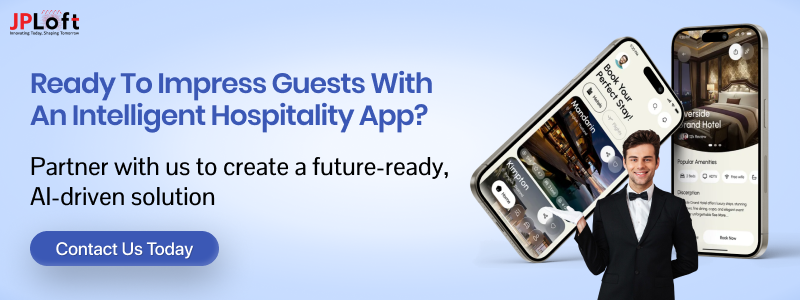
Wrapping Up
AI is no longer just a futuristic idea in hospitality; it's a game-changer shaping the industry today.
From personalized guest experiences and seamless operations to smart marketing and real-time feedback management, AI is unlocking new levels of efficiency and satisfaction.
As hotels embrace AI-powered solutions like chatbots, IoT integrations, and advanced analytics, they not only enhance guest loyalty but also drive revenue growth and operational excellence.
For businesses ready to stay competitive and innovative, successful AI integration tailored to unique needs is key.
The future of hospitality is smart, connected, and powered by AI, and it's happening now.
FAQs
AI in hospitality powers personalized guest experiences, automates front-desk tasks, manages smart room features, analyzes feedback, predicts demand, and boosts marketing efforts with real-time data insights and behavior-based recommendations.
AI improves efficiency by automating tasks, enhances personalization by learning guest preferences, increases revenue through dynamic pricing, ensures better guest engagement, and supports decision-making through predictive analytics and sentiment tracking.
AI-powered chatbots provide 24/7 support, handle bookings, answer FAQs, make personalized recommendations, and reduce staff workload—offering instant, multilingual service that improves guest satisfaction and loyalty.
Yes, initial costs can be high, including setup and training. However, options like AI as a Service (AIaaS) and scalable tools make it more accessible. The long-term ROI in efficiency, guest retention, and personalization is worth the investment.
Because the future of hospitality is AI-driven and already here. Businesses adopting AI now gain a competitive edge with personalized services, smarter operations, and stronger guest relationships.





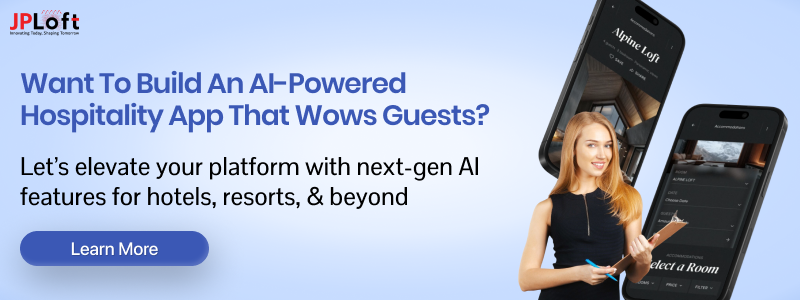
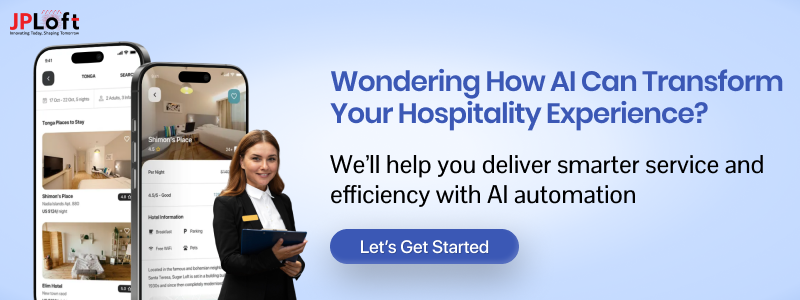

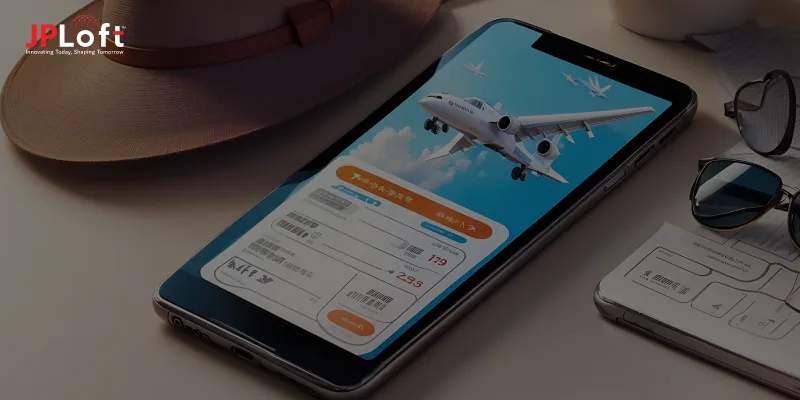
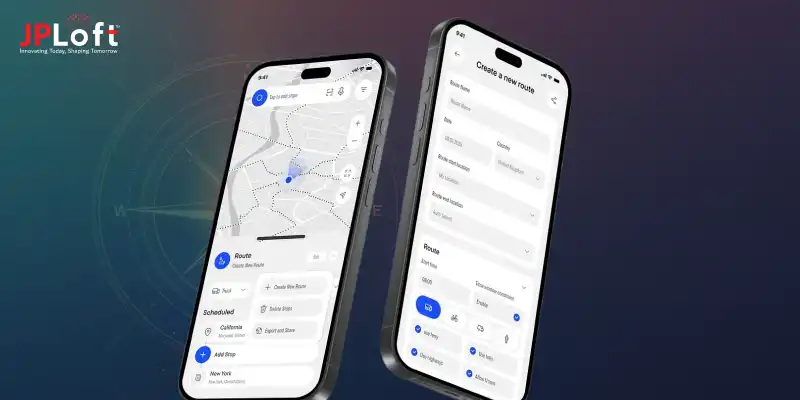
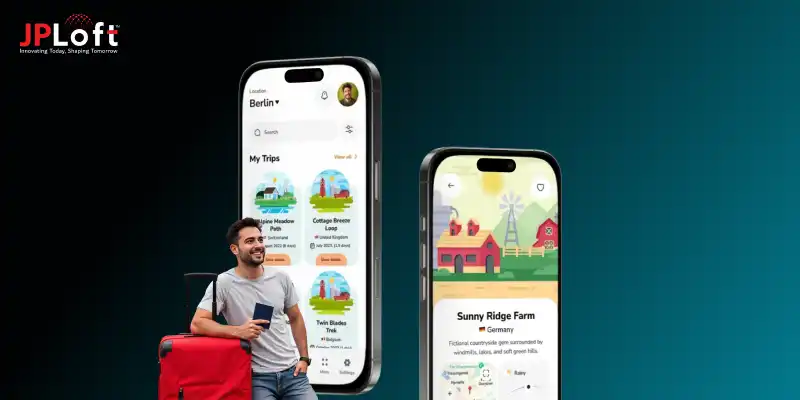


Share this blog